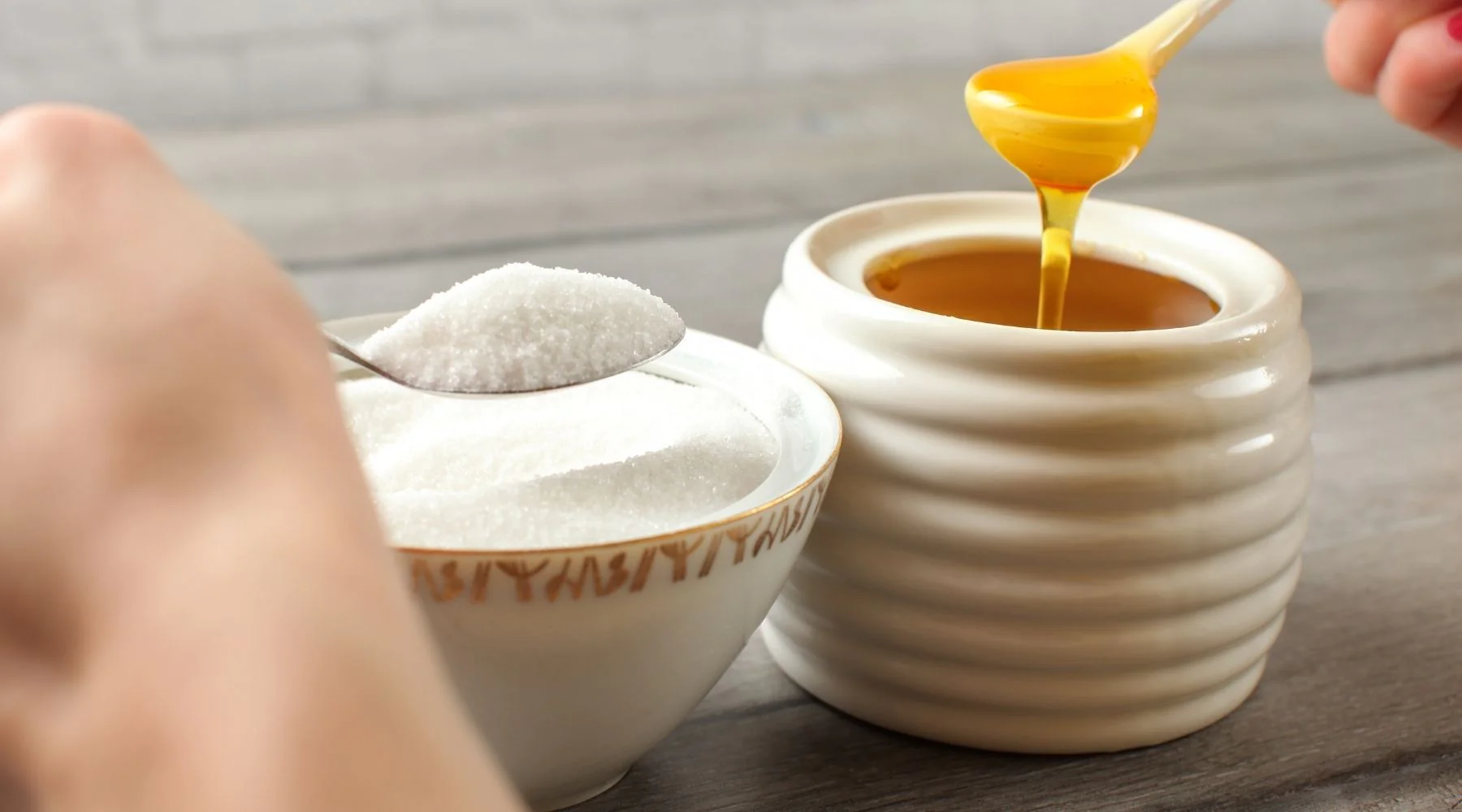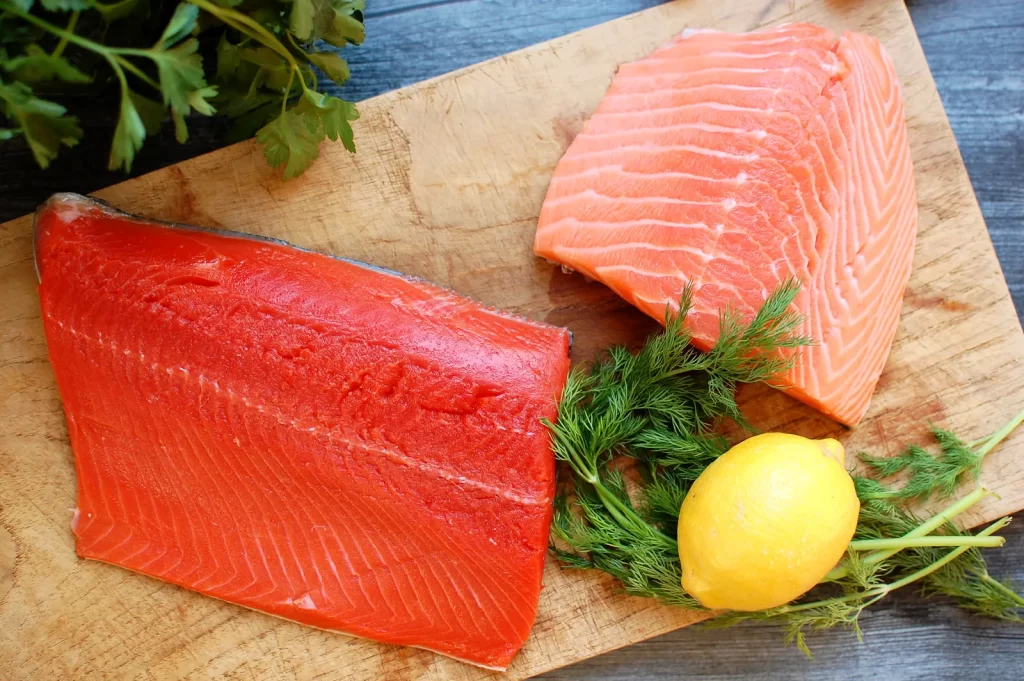Honey and sugar are both popular sweeteners used in various cuisines around the world, but they differ significantly in composition, taste, and nutritional value. Honey, a natural substance made by bees, is composed of fructose, glucose, and water, and contains trace amounts of vitamins, minerals, and antioxidants. Its flavor is richer and more complex than sugar, varying depending on the flowers visited by the bees.
In contrast, sugar, typically derived from sugar cane or sugar beets, is primarily sucrose and offers a straightforward, sweet taste. It lacks the nutritional components found in honey but is often preferred for its consistency and predictability in recipes. While both add sweetness to foods and beverages, their unique characteristics cater to different culinary needs and health considerations.
Definition of Honey
Honey is a sweet, viscous food substance produced by bees and some related insects. Bees produce honey from the sugary secretions of plants (floral nectar) or secretions of other insects (such as honeydew), by regurgitation, enzymatic activity, and water evaporation.

Stored in wax structures called honeycombs, the variety of honey produced by honey bees (the genus Apis) is the most well-known, due to its worldwide commercial production and human consumption.
Honey is characterized by its distinctive taste, which varies depending on the types of flowers from which the nectar is harvested. It is commonly used as a sweetener in food and beverages, and it has been valued for its medicinal properties since ancient times.
Definition of Sugar
Sugar is a class of carbohydrates that tastes sweet and is used extensively as a sweetener in food. It is primarily composed of sucrose, which is a molecule made up of glucose and fructose. The most common source of sugar is sugar cane or sugar beet, from which sucrose is extracted and refined for use in cooking, baking, and as an additive in various food products.

In addition to sucrose, there are other types of sugars, such as fructose (found in fruits), lactose (found in milk), and glucose (a simple sugar and a basic energy source for living organisms).
Sugar is known for its role in food preparation and preservation, but it is also a focus of health discussions due to its high caloric content and its links to various health issues when consumed in excess.
Importance of understanding their differences
Understanding the differences between honey and sugar is important for several reasons:
- Nutritional Content: Honey contains trace amounts of vitamins, minerals, and antioxidants, while sugar is mostly devoid of nutrients. This difference in nutritional value is significant for those seeking to maximize the health benefits of their diet.
- Glycemic Index: Honey has a slightly lower glycemic index (GI) than sugar, meaning it causes a more gradual rise in blood sugar levels. This is particularly relevant for people with diabetes or those trying to manage their blood sugar levels.
- Flavor and Culinary Uses: Honey has a more complex flavor profile compared to the straightforward sweetness of sugar. This impacts the taste and quality of recipes and might influence the choice of sweetener based on the desired flavor outcome.
- Caloric Density: While both are high in calories, honey is denser in calories than sugar. This means you might need less honey to achieve the same level of sweetness, which is important for calorie-conscious individuals.
- Environmental and Ethical Considerations: The production processes of honey and sugar have different environmental impacts. Honey production is closely tied to beekeeping and has implications for pollinator health and ecosystems, while sugar production, especially on a large scale, can have significant environmental impacts including land use changes and water consumption.
- Health Implications: Overconsumption of any sweetener, including both honey and sugar, can lead to health issues such as obesity, heart disease, and dental problems. The presence of antioxidants in honey might offer some health benefits not found in sugar.
Understanding these differences can guide consumers in making informed choices about their dietary intake, considering factors like health, cooking requirements, and environmental impact.
Comparison table of Honey vs Sugar
Here’s a comparison table outlining the key differences between honey and sugar:
| Aspect | Honey | Sugar |
|---|---|---|
| Source | The natural substance made by bees. | Derived from sugar cane or sugar beets. |
| Composition | Fructose, glucose, water, trace minerals, vitamins, and antioxidants. | Primarily sucrose, lacks vitamins and minerals. |
| Caloric Content | More calories per teaspoon compared to sugar. | Less caloric per teaspoon than honey. |
| Glycemic Index | Generally lower than sugar, causing a more gradual increase in blood sugar. | Higher, leading to quicker spikes in blood sugar. |
| Flavor | Richer, more complex, varies based on the flowers used. | Straightforward sweet taste, and more consistent. |
| Nutritional Value | Contains trace nutrients and antioxidants. | Lacks additional nutrients, primarily empty calories. |
| Environmental Impact | Depends on beekeeping practices; important for pollination and ecosystem health. | Large-scale production can have significant environmental impacts like land use changes and water consumption. |
| Health Considerations | May have additional health benefits due to antioxidants, but still high in sugar. | High sugar content with no additional health benefits; is linked to various health issues when consumed in excess. |
| Culinary Uses | Used for its distinctive flavor; can affect the taste of dishes. | Commonly used for its neutral sweetness; doesn’t alter the flavor profile of dishes. |
This table highlights the fundamental differences between honey and sugar, considering various aspects from their source and composition to their impact on health and the environment.
Benefits of Honey
Honey offers several benefits, making it a valuable addition to many diets and a component in traditional remedies:
- Natural Sweetener: Honey is a natural source of sweetness, often considered a healthier alternative to refined sugars due to its lower glycemic index and additional nutrients.
- Contains Nutrients: Unlike refined sugar, honey contains trace amounts of vitamins and minerals, including B vitamins, calcium, iron, potassium, and magnesium.
- Rich in Antioxidants: It is a good source of antioxidants, including phenolic acids and flavonoids, which are linked to various health benefits like reduced inflammation and heart disease risk.
- Wound Healing Properties: Honey has antibacterial and anti-inflammatory properties, making it beneficial for wound healing. Medical-grade honey is even used in some wound dressings.
- Soothing for Sore Throats: Its antimicrobial properties and consistency make honey effective for soothing sore throats and can be an effective cough suppressant.
- Gastrointestinal Health: Honey can contribute to gastrointestinal health; it’s sometimes used as a prebiotic to support beneficial gut bacteria.
- Athletic Performance: Some studies suggest that honey can be an effective form of carbohydrate to consume before exercise, potentially improving endurance.
- Skin Care: Due to its moisturizing and nourishing properties, honey is a popular ingredient in natural skin care products.
- Reduction of Allergy Symptoms: There’s anecdotal evidence that locally sourced honey can help reduce allergy symptoms, although scientific data on this is not conclusive.
- Less Processed: Generally, honey undergoes less processing than sugar, especially raw and unfiltered varieties, retaining more of its natural properties.
It’s important to consume honey in moderation due to its high sugar content, and it should not be given to infants under one year old due to the risk of botulism.
Benefits of Sugar
Sugar, commonly used as a sweetener, also offers several benefits, particularly in culinary and non-dietary applications:
- Instant Energy Source: Sugar is a simple carbohydrate that provides a quick source of energy, as it is easily broken down by the body.
- Taste Enhancement: It enhances the flavor of foods and beverages, balancing acidity and bitterness, and bringing out other flavors.
- Preservative: Sugar helps in preserving foods, such as in jams and jellies, where its high concentration inhibits bacterial growth.
- Fermentation: In baking and brewing, sugar is crucial for fermentation, feeding yeast to produce carbon dioxide in bread making or alcohol in brewing.
- Browning and Texture: In cooking and baking, sugar contributes to the browning of foods through caramelization and the Maillard reaction, as well as affecting texture.
- Energy for Brain: Glucose, a component of sugar, is one of the main energy sources for the brain, necessary for cognitive functioning.
- Versatility in Cooking: Sugar is versatile in cooking, used in a wide array of recipes from savory dishes to desserts and baked goods.
- Economical Sweetener: It is generally more affordable and accessible than other sweeteners, making it a staple in many households and industries.
- Buffering Agent: Sugar can act as a buffering agent, helping to maintain the pH level in foods.
- Non-Dietary Uses: Beyond cooking, sugar has applications in non-food contexts, such as in certain types of biodegradable plastics, medications, and skincare products as a natural exfoliant.
While sugar is useful in many ways, it’s important to consume it in moderation due to its potential health impacts, including an increased risk of obesity, heart disease, and dental problems when consumed excessively.
Which is more beneficial for our body honey or sugar?
Choosing between honey and sugar in terms of health benefits depends on several factors including nutritional content, overall diet, and individual health goals or conditions.

Here’s a comparison to help understand which might be more beneficial:
Honey
- Nutritional Value: Honey contains trace amounts of vitamins, minerals, and antioxidants, which sugar lacks. These nutrients can contribute positively to health.
- Lower Glycemic Index: Honey has a slightly lower glycemic index compared to regular sugar, meaning it may have a less immediate impact on blood sugar levels.
- Antimicrobial Properties: It possesses antimicrobial properties and can be beneficial for throat infections or as a topical treatment for minor wounds.
- Natural Product: Being a natural product, it undergoes less processing than sugar, especially in its raw form.
Sugar
- Consistency in Cooking: Sugar offers consistency and predictability in cooking and baking which can be important in certain recipes.
- Caloric Density: Per teaspoon, sugar has fewer calories compared to honey. However, this might not be significant if used in large quantities.
- Neutral Flavor: Sugar has a neutral flavor, making it versatile for use in various recipes without altering the taste profile.
Considerations
- Individual Health Goals: For someone watching their calorie intake or managing blood sugar levels, understanding how each sweetener affects these factors is crucial.
- Allergies and Sensitivities: For those with allergies to pollen or certain types of honey, sugar might be the safer choice.
- Moderation is Key: Regardless of choice, moderation is essential. Both honey and sugar are high in sugar and should be consumed in limited amounts.
- Context of Diet: The overall dietary pattern plays a crucial role. A diet rich in fruits, vegetables, whole grains, and lean proteins can better accommodate the inclusion of sweeteners than a diet already high in sugars and processed foods.
While honey offers more nutritional benefits and a lower glycemic index, the most beneficial choice depends on individual dietary needs, health goals, and moderation in consumption. For specific health concerns or conditions like diabetes, consulting with a healthcare professional for personalized advice is recommended.
Culinary uses of Honey vs Sugar
Honey and sugar, both sweeteners have distinct characteristics that influence their culinary uses:
Honey uses of Honey:
- Flavor Enhancer: Honey adds a unique, rich flavor to dishes. Its taste can vary depending on the flowers visited by the bees, offering a range of flavor profiles.
- Baking: Used in baking, honey imparts moisture and a distinct flavor. It can lead to denser, moister baked goods compared to sugar.
- Glazes and Marinades: Excellent for glazes and marinades due to its viscosity and ability to caramelize at high temperatures, adding a rich, golden color.
- Sweetening Beverages: Popular in tea and other beverages, where its distinct flavor can complement the drink.
- Natural Preservative: Acts as a natural preservative and can be used in homemade jams and preserves.
- Health Foods: Often used in health-oriented recipes as a substitute for refined sugar.
- Salad Dressings: Adds a sweet element to salad dressings, balancing acidic components.
Sugar uses of Sugar:
- Baking: Sugar is essential in baking, not just for sweetness but also for texture and color. It helps in the creaming process and caramelization.
- Preserving: Sugar is key in preserving fruits, jams, and jellies, where high sugar concentrations are necessary.
- Candy making: Critical in candy making for its ability to form syrups, caramelize, and create different textures.
- Sweetening Beverages: Commonly used to sweeten coffee, tea, and other beverages due to its neutral flavor and quick dissolving properties.
- General Cooking: Used in general cooking to balance acidity and enhance flavor, especially in sauces and glazes.
- Fermentation: In baking bread or brewing, sugar is a food source for yeast, aiding in fermentation.
- Decoration: Granulated or powdered sugar is used for decoration, like dusting on desserts.
Considerations
- Sweetness Intensity: Honey is sweeter than sugar, so you might use less of it.
- Texture and Moisture: Honey adds more moisture to dishes, which can affect the texture, particularly in baking.
- Heat Sensitivity: Honey can burn more easily than sugar, requiring careful temperature management.
- Health Preferences: Those looking to avoid processed foods might prefer honey.
- Flavor Profiles: The choice may depend on whether a neutral sweetness (sugar) or a distinct flavor (honey) is desired.
While both are used to sweeten foods and beverages, their unique properties make them suitable for different culinary applications, with honey often being chosen for its distinct flavor and additional moisture, and sugar for its neutral taste and textural properties in baking and preserving.
Concern about Honey and Sugar
Both honey and sugar, while widely used and beneficial in various ways, raise certain concerns, especially when consumed in excess:
Honey
- High in Calories and Sugars: Honey is high in fructose and glucose, contributing to increased calorie intake and potential weight gain.
- Not Safe for Infants: It should not be given to infants under one year old due to the risk of botulism, a rare but serious form of food poisoning.
- Blood Sugar Impact: Despite its lower glycemic index compared to sugar, honey can still cause spikes in blood sugar levels, particularly concerning for people with diabetes.
- Allergic Reactions: Some individuals may have allergic reactions to specific types of pollen in honey.
- Environmental Concerns: Unsustainable beekeeping practices can harm bee populations and the environment.
- Quality Variations: The nutritional content and purity of honey can vary significantly depending on its source and processing.
Sugar
- Empty Calories: Sugar provides calories without essential nutrients, contributing to an imbalanced diet if consumed excessively.
- Risk of Obesity and Metabolic Disorders: High sugar intake is linked to obesity, type 2 diabetes, and metabolic syndrome.
- Dental Health Issues: Consuming too much sugar increases the risk of dental cavities and gum disease.
- Blood Sugar Spikes: Sugar consumption can lead to spikes in blood glucose levels, posing a risk for diabetics and potentially leading to insulin resistance.
- Addictive Properties: Sugar can be addictive, leading to overconsumption and associated health problems.
- Environmental Impact: The production of sugar, especially from sugar cane, can have significant environmental impacts, including land degradation, water pollution, and deforestation.
- Heart Health: Excessive sugar intake has been linked to an increased risk of heart disease.
Both honey and sugar can be part of a healthy diet when consumed in moderation, but awareness of these concerns is important for making informed dietary choices.
Similarities between Honey vs Sugar
Honey and sugar, while different in various aspects, also share several similarities:
- Sweetness: Both honey and sugar are primarily used as sweeteners in foods and beverages due to their sweet taste.
- Carbohydrate Content: They are both high in carbohydrates, mainly in the form of simple sugars.
- Energy Source: As sweeteners are high in sugars, both provide a quick source of energy to the body.
- Versatility in Cooking and Baking: Honey and sugar can be used in a variety of culinary applications, including baking, cooking, and as additives in beverages.
- Shelf Stability: Both honey and sugar have long shelf lives when stored properly.
- Caloric Density: They are calorie-dense, meaning they provide a significant amount of calories relative to their volume.
- Impact on Blood Sugar Levels: Both can impact blood sugar levels, necessitating moderation in consumption, especially for individuals with diabetes or those monitoring their blood sugar levels.
- Potential for Overconsumption: Due to their sweet taste, there’s a risk of overconsumption, which can lead to health issues such as weight gain and dental problems.
- Preservation Properties: Both honey and sugar have natural preservation qualities and can be used to extend the shelf life of certain foods.
- Water Solubility: They are both soluble in water, making them easy to incorporate into various recipes and beverages.
These similarities primarily stem from their roles as sweeteners and their basic chemical compositions as forms of sugar, despite the differences in their specific types of sugars, nutritional content, and flavor profiles.
Conclusion
Honey vs Sugar are both popular sweeteners with distinct characteristics. Honey, a natural substance produced by bees, offers additional nutritional benefits such as antioxidants, vitamins, and minerals, and has a lower glycemic index than sugar, making it a slightly healthier option in moderation. It also possesses unique flavors influenced by the source of the nectar.
On the other hand, sugar, primarily composed of sucrose, is a more refined product with a neutral taste, making it versatile for various culinary uses. It lacks the nutritional components present in honey. Both honey and sugar should be consumed in moderation due to their high sugar content. The choice between them depends on individual health goals, dietary needs, and culinary preferences, with honey often being the preferred choice for those seeking a more nutritious alternative.


